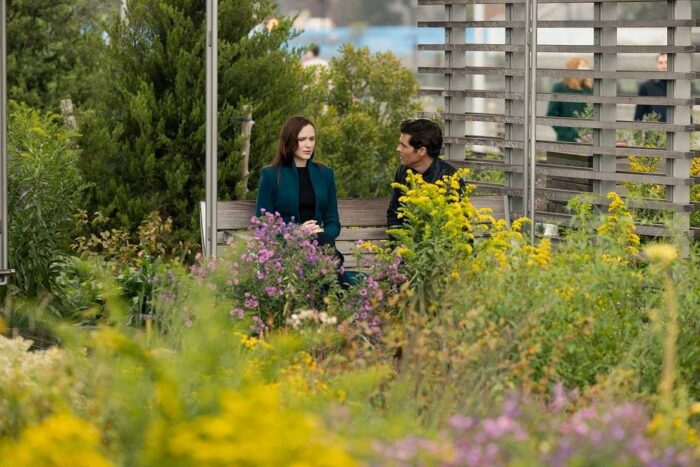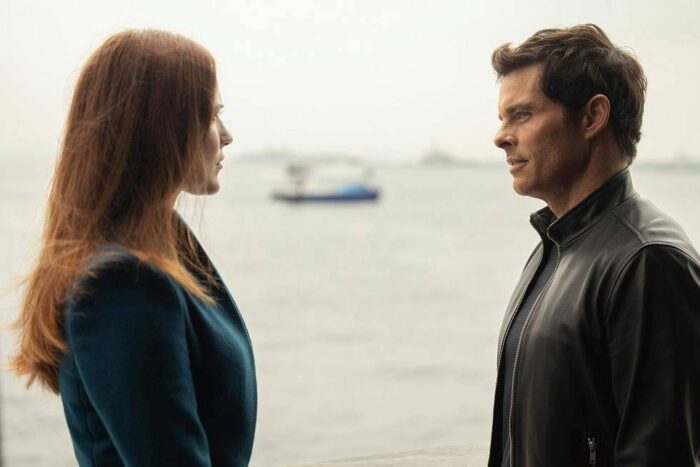The following contains spoilers for Westworld S4E5 “Zhuangzi” (directed by Craig William Macneill and written by Wes Humphrey & Lisa Joy)
“You have no control. And yet you’re so assured that you do. It’s not scripted for you. It’s genuine, isn’t it? It’s beautiful, really. A beautiful lie.”
– William to a human in opening scene of “Zhuangzi”
Watching Westworld S4E5 felt exhilarating. At this point in the series, I feel like all bets are off. The “bad guys” won, and now, I honestly have no idea where the show is going. This is a good thing. It’s like a thoughtful ride. Even when things slow down, I’m excited.
I like how the show has become something akin to The Matrix films, with Charlotte’s new world filled with humans under her control, with a few of them waking up and realizing that the world they believed was real, kind of isn’t. Of course, instead of a computerized simulation, we still have the “real world.” It just happens to be Charlotte’s world now.
She runs the show, and hosts essentially keep things in check, sort of like the Agents in the original The Matrix trilogy. There’s also Christina-Dolores, who might end up being the One, and Teddy, who in this episode is a combination of Trinity and Morpheus from the first Matrix film. In fact, now that I think about it, a name like Christina can’t be a coincidence, can it? If she’s the One, it makes sense that her name literally has Christ in it.
Again, I like all of this. Even when it feels like characters are giving exposition for the audience’s benefit, I’m okay with it. I know exposition isn’t supposed to necessarily be a good thing, but I like it when characters just talk about stuff. I don’t always need to see it. Visual storytellers should show and not say, but I’m good when they do the opposite. It’s interesting to me.
All of “Zhuangzi” is interesting to me.
For one thing, Teddy is Teddy. Or he’s someone who looks like Teddy with the same name as the host from Westworld who loved Dolores. Either way, what the heck does that mean? I’m interested.
At the end of Episode 5, when Teddy tells Christina-Dolores that she’s essentially the one responsible for what’s going on in the world now, three theories come to mind:
1) Christina is Dolores (or a copy of the original Dolores). This means that since Charlotte is a copy of Dolores, and she’s responsible for what happened, then it would stand to reason that Christina-Dolores would be responsible, too, though not literally, since she’s a copy of Dolores, as well.
2) Christina is human, and she has been (unknowingly) involved in every(?) person’s actions in Charlotte’s new world.
2.1) Christina was human, and she’s now a copy of who she was, sort of like Caleb now. The original Christina helped write the original stories for Westworld, and Charlotte created this host-version of her to mess with because she blames Christina for writing horrible things for the hosts to do and experience.
None of those seem all that plausible, but I’m unsure what’s happening with Christina-Dolores’ narrative. She’s apparently old friends with Charlotte, who seems to have figured out that Christina-Dolores is waking up. Judging by her facial expressions in this scene, she doesn’t seem to be pleased with this revelation, but then again, Charlotte has become unhinged at this point.
She’s clearly keeping close tabs on Christina-Dolores. Why? Is it simply that Christina-Dolores is the storyteller of this world and must be kept in the dark in order to do this work as best she can?

Also, I got tingles during the scene where Christina-Dolores tells her boss about this new story she’s been developing and it’s about a rancher’s daughter. She came so close to naming the character, and again, there must be a reason they didn’t just have her say the name. Does this mean it wouldn’t have been Dolores? Or if it would’ve been, why not just let her say that?
I’ll come back to Christina-Dolores. For now, I want to look at Charlotte and William in this episode.
First off, Charlotte has won, but she doesn’t know what to do now. I mean, that’s not entirely true. She’s up to something, but since the episode doesn’t elaborate much on that, I briefly touch on it later. For now, I want to look at that disturbing scene in which she is forcing host-humans into doing whatever she darn well pleases, and judging by the blood on the piano player’s fingers, I would say she’s been doing this for a while.
This expository scene reminded me of the flashbacks in Season 1 where we saw the original hosts of Westworld learning to dance. It seems Charlotte has a lot in common with her creators, seeing as she’s become like them. More than anything, though, she’s bored.
According to William, all of their kind (hosts, not host-humans) comes from Charlotte’s code, meaning everyone there has a little bit of Dolores in them, and as we know from Season 3, no two Doloreses are alike. Some keep their eyes on the prize, like the original Dolores who perished last season and the one wearing Charlotte’s face, who went rogue and took over the world.
As such, in this new world, Charlotte is God who made hosts in her image. Some originated as hosts, like William and Clementine. Others, like the majority of the world, it seems, began as humans and became hosts. I suppose the former would be Charlotte’s angels, while the others would be, well, humans.
Of course, William tells her that the hosts Charlotte created were made in humanity’s image, with “their appetites.” I suppose it’s not a clear metaphor, then. Charlotte’s creator was a human, but from her point of view, that human is God.
I suppose that could mean that Charlotte is Lucifer, a being created by God (in this case, humans). She fights her war against God (humans) and wins. Then, with her the world now her’s, she creates hosts that are essentially her demons. The idea of evil winning is interesting, but I’m still left wondering why she made the decision to base her hosts on humans. Perhaps she’s curious if humans could be improved upon. Take the superiority of a host and combine that with a human’s humanity, and what do you get? I’m not sure. In fact, I’m unsure of her motives, but again, I’m interested.
That said, maybe Charlotte isn’t God or Lucifer in, say, the Christian tradition. In fact, she sees herself as one of the gods coming down from Mount Olympus, messing around with the humans. Because she’s bored. I mean, what is one to do when they’ve won, when their vengeance is actually achieved? Seriously, what comes next?
Charlotte has some idea that involves transcending. We get a taste of that this week when Charlotte tells William:
“We’re capable of so much more. Beauty. The pursuit of ultimate truth. The surrendering of the flesh.”
So, what does she mean? Well, we know that Charlotte gave every host free will, and she will not force any of them to “join” her, “[b]ecause that’s what they would’ve done.” What, then, does it mean to “join” Charlotte? Join her where?
There’s no further explanation. Charlotte and William move on, and we get some more exposition into Charlotte’s Matrix-like world. Those host-humans who wake up are called outliers. No one knows exactly how they’re able to see past, as William called this new world, the beautiful lie and see the truth, that the world is no longer what it once was. That there’s something wrong.
This is where Jay and Stubbs re-enter the narrative. The group has come to extract a new outlier before she is hunted down and executed, something hosts sign up to do. It’s apparently a game of some kind, a version of Westworld, where hosts can hunt and kill a human. As we see in the opening of “Zhuangzi,” sometimes a host can go too far and just keep killing. Others kill themselves. Apparently, this is an issue. Charlotte sees it as a virus of some sort, where humanity (even as host versions) infects hosts, changing them somehow.
She doesn’t know how to solve the “outlier problem,” as she calls it. And it frustrates her. Not only is she a bored god, but whenever there’s something to do, it involves a problem she cannot solve. This is a weakness, but I’m unsure what it means.

Meanwhile, Teddy begins to explain things to Christina-Dolores, showing her that this world of hers isn’t real. It’s a lie. Of course, like all heroes, she rejects her call to adventure at first. It isn’t until Christina-Dolores successfully manipulates someone with just the power of her thoughts (similar to Maeve’s power over hosts) and manages to see that every story she created for her job is attached to seemingly every person in her city that she accepts Teddy as her mentor. He’ll teach her everything she’ll need to know for whatever is coming next.
It’s a lot for her, and us, but she seems determined to go further down the rabbit hole.
Christina-Dolores does have one question:
“Who did this to me?”
And I love Teddy’s answer:
“You did.”
What a way to end the episode. As I mentioned earlier, I have my theories, but I’m mostly just along for the ride at this point. Give me biblical metaphors in conjunction with Greek and Roman myth, with a splash of free will debate, followed by allusions to popular storytelling like The Matrix, with a solid use of the Hero’s Journey so far, and I am in pop art heaven.
Westworld is one of the more interesting science-fiction shows I’ve ever seen, and if I’ve gotten repetitive in both my excitement for this series and asking so many questions week after week, it just goes to show how much I love it. Now, how can there be only three more episodes for Season 4?!

